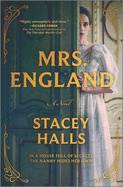
Mrs. England, set in 1904 West Yorkshire, offers slow-burn thrills and chills as one young woman gradually gets the creeping feeling something is amiss in the house she cannot leave. In this revamp of the classic Victorian governess story, Stacey Halls (The Familiars; The Foundling) provides a gothic-infused historical drama with a contemporary twist.
After resigning from her nursing post when her employer moves to America, Ruby May is on thin ice with her mentor, Miss Simpson. Sim, the principal at the Norland Institute, where all great nurses are trained, warns Ruby that three failed assignments means the end of her affiliation with the program. Ruby, who narrates the novel, is then sent off to her new position, caring for the England family children. The Englands, from what Ruby can tell, are a powerful family, inheritors of a mill fortune, who live in a beautiful but austere country home with their four kind and precocious children--two boys and two girls. Ruby is determined not to fail them.
But all is not what it seems in the England household. Mrs. England is cold and distant, the other house staff are distrusting and jaded, and Mr. England is uncommonly friendly and insists on being involved in everything Ruby does. As Ruby becomes closer to her wards, she grows determined to protect them from the danger she senses lurking in every corner of the house. And because Ruby feels increasingly isolated in her liminal role in the household, she cannot stop thinking about the traumas from her own past that brought her to this house--traumas that help her begin to see Mrs. England's strange behavior in a new light.
Halls is no stranger to richly atmospheric settings and pitch-perfect period details. As in her other two novels, she captures an elusive sense of a place and time without obscuring it with too much nostalgia or glamour: "The strange hissing noise continued, and as my eyes accustomed to the darkness I could make out the blue-black sky, with a clouded moon... among the dampness was a distinct smell, a green smell... cold and fresh as spring water, entirely unlike the heavy smoke and dust I was used to... the noise was a river, growing louder now, as though we had disturbed it."
The setting is refreshingly rich and lived-in, and the characters are vital, complex and imperfect. While the narrative stays focused on Ruby's constrained position in the England house, Halls still manages to depict the intricate social connections among the household and surrounding areas. She populates the tale with expertly crafted characters who, though minor, leave a lasting impact on readers through their inability to be easily pinned down. What's more, this setting is rife with all the underlying class tensions, competing motives and unexpected intimacies of a small community with a shared past and uncertain future.
Unanticipated as well as unwanted intimacy is, ultimately, what defines Ruby's story, both in terms of her job and her simultaneously inescapable and pragmatic impulse toward empathy. Hardworking and intelligent, clear-eyed and morally centered, Ruby appears to be a person unlikely to ever have her certainty swayed. And yet, time and time again, it is Ruby's dedication to care, her emotional attachment to others and her intuitive nature that entrap her in interpersonal battles over power and control. By revisiting the role of the nurse in the Victorian household at the turn of the century, Halls casts new light on the tense and unusual situation such women found themselves in: both part of and separate from a family, intimate with and yet separate from the children they come to love as their own.
Central to the novel's growing tension is Halls's skill in implying danger while never allowing Ruby to look it in the face: " 'Oh, and one more thing,' [Mr. England] said, continuing to cut up his food. 'Please lock the nursery at night.' " The sense that something is lurking behind every corner is inescapable in Mrs. England, even as readers come to suspect the source of the household's uneasiness. As Ruby traverses labyrinthine hallways, stormy moors and candle-lit nurseries, readers are inevitably drawn in, like Ruby, to the house's mysteries, despite the simultaneous impulse to run. Both interpersonal and economic forces constrain Ruby to this haunted house, making her inability to escape--unlike more contrived girl-trapped-in-a-house tales--even more pointed and affecting.
But at the heart of the novel's suspense is the secret that Ruby herself holds, a secret that begins to psychologically resurface in the context of her entrapment. Never giving into the familiar gimmick of casting Ruby as an unreliable narrator, Halls instead paints her traumatic past as part of the larger context for her decisions, her fears and her desires. Halls's inventive use of tropes, atmospheric writing and deftness with characters conveys, better than most, how true evil or danger is not so easily pinned down to a single source but exists as a complex and diffuse result of the world in which her heroine lives. --Alice Martin

